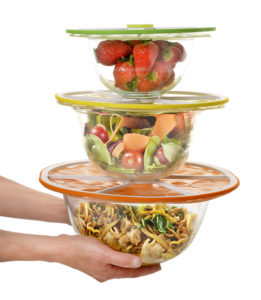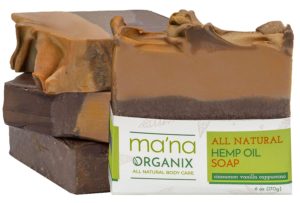
The Jewish holiday of Passover begins April 10, 2017 and ends April 18. Here are nine ways you can celebrate this meaningful holiday while keeping true to your environmental values and supporting a more sustainable food system, with thanks to Danielle Nierenberg, the president of Food Tank (learn more below).
Sustainable Passover Seder
1. Don’t Cook Too Much!
There’s something about a holiday that can drive people to buy and prepare way too much food. Before you shop, plan your menu so that you’ll serve a totally satisfying meal without overdoing it. Here are some good portion planning tools you can use.
 2. Serve Local and Sustainably Grown Food at Your Seder Table
2. Serve Local and Sustainably Grown Food at Your Seder Table
The Seder table is a perfect place to incorporate locally grown food.
For your charoset, a fruit and nut paste symbolizing brick and mortar, try buying locally grown or organic apples and fair-trade pecans.
For your Seder plate, look for pasture-raised meat, eggs, and dairy products.
Shop at farmers markets or buy from the “local” produce sections in your grocery store. Wherever possible, support farmers who are committed to sustainable practices in agriculture.
3. Unplug During Chol Hamoed
Spend leisure time with your family outdoors during the days of Chol Hamoed (the intermediate days between the festivals of Passover) instead of watching TV or using electronic entertainment.
By taking an occasional rest from energy-intensive activities, you can save thousands of tons of carbon emissions a year (and burn off a few calories of your own).
According to Dr. Laura Iraci of the Earth Science Division at the NASA/Ames Research Center, one hour of TV watching produces 54 kilograms of carbon dioxide, which is more than the 11 kilograms of carbon dioxide produced by burning one gallon of gasoline.
4. Make Passover Eve a Meatless Monday
In 2017, Passover Eve and the night of the first Seder falls on a Monday. Try using this opportunity to go meatless for at least one of the Seders.
Industrial meat produced on huge factory farms is the number-one contributor to greenhouse gases. The Environmental Working Group (EWG) reports that the production, processing, and distribution of meat requires huge amounts of pesticides, fertilizer, fuel, feed, and water. EWG also found that red meat is responsible for 10 to 40 times as many greenhouse gas emissions as vegetables and grains.
Need Some Meatless Monday Recipes? Try these for:
Grilled Tofu Salad
Zucchini Frittata
Quick Cauliflower Couscous
5. Eat Ugly
Globally, we have a substantial wasted produce problem: 20 to 40 percent of all produce goes uneaten, mostly because it does not meet strict grocer cosmetic standards for size, shape, or color. A variety of grocery stores sells this “ugly” produce, including Whole Foods and Giant Eagle.
Farmers markets sell “seconds” at a discount. You can peel away the bruised skin or rind without losing much of the actual food. Use produce that’s slightly past its prime in soups, stews and compotes – it will still be delicious and packed full of nutrients, and no one will know what it looked like before you cooked it!
6. Support Good Food Policies
Use dinner as an opportunity to discuss with friends and relatives how food should be a non-partisan issue. “Reduction of food losses and waste needs to be prioritized within political agendas,” says the Barilla Center for Food & Nutrition. ReFED, a collaboration of business, nonprofit, and government leaders fighting food waste in the United States, recommends standardizing date labeling, increasing food donation tax incentives, and expanding best practices in food recycling.
Find out where your legislators stand on food issues by checking out this scorecard from Food Policy Action.
Don’t Miss: Three Best Ways to Reduce Food Waste
7. Offer, Don’t Serve
Even with careful planning, it’s hard to know how much people will eat. To allow for different sized appetites, let guests decide how much they want. Creating a buffet line or letting guests serve themselves at the table family-style can reduce what gets left behind on plates.
 8. Create New Innovative Meals From Holiday Leftovers
8. Create New Innovative Meals From Holiday Leftovers
An important tenet of Judaism is “bal tashchit,” meaning not to waste. According to the U.N. Food and Agriculture Organization (FAO), roughly one-third of all food produced for human consumption—or approximately 1.3 billion tons—is lost or wasted each year.
This Passover, instead of throwing away uneaten food, incorporate leftovers into stir-fry dishes or stews, such as vegetarian cholent (a traditional Jewish stew).
Don’t lose track of leftovers by keeping them in glass see-through containers.
9. Use Doggy Bags and Donate to Food Kitchens
Encourage your guests to bring their own “doggy bags” or reusable food containers so they can take home leftovers if you can’t use them all. If your temple (or church) is hosting a community Seder, arrange in advance to donate leftovers to a soup kitchen or shelter.
Many thanks to Danielle Nierienberg, the President of Food Tank, for her original post on hosting a sustainable Passover Seder. Food Tank is a powerful advocate for just and sustainable agriculture. You can read more about them at FoodTank.com.

















